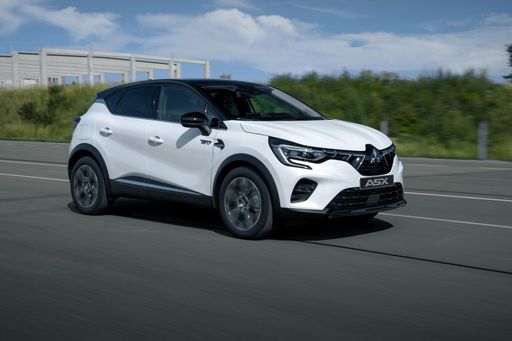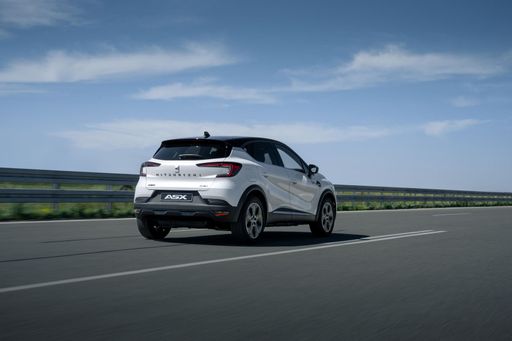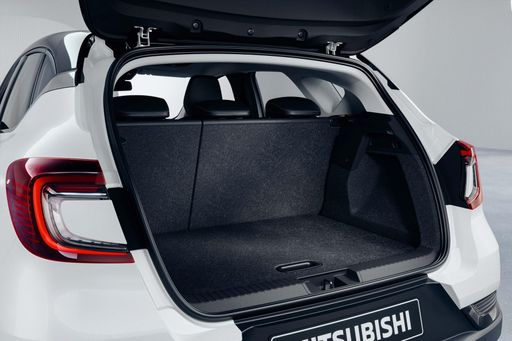Mitsubishi ASX vs VW Tiguan - Differences and prices compared
Costs and Efficiency:
Price and efficiency are key factors when choosing a car – and this is often where the real differences emerge.
Mitsubishi ASX has a decisively advantage in terms of price – it starts at 20600 £, while the VW Tiguan costs 32800 £. That’s a price difference of around 12223 £.
Fuel consumption also shows a difference: VW Tiguan manages with 1.40 L and is therefore clearly more efficient than the Mitsubishi ASX with 4.40 L. The difference is about 3 L per 100 km.
Engine and Performance:
Power, torque and acceleration say a lot about how a car feels on the road. This is where you see which model delivers more driving dynamics.
When it comes to engine power, the VW Tiguan has a significantly edge – offering 272 HP compared to 158 HP. That’s roughly 114 HP more horsepower.
In acceleration from 0 to 100 km/h, the VW Tiguan is clearly quicker – completing the sprint in 5.90 s, while the Mitsubishi ASX takes 8.50 s. That’s about 2.60 s faster.
In terms of top speed, the VW Tiguan performs distinct better – reaching 242 km/h, while the Mitsubishi ASX tops out at 180 km/h. The difference is around 62 km/h.
There’s also a difference in torque: VW Tiguan pulls evident stronger with 400 Nm compared to 270 Nm. That’s about 130 Nm difference.
Space and Everyday Use:
Beyond pure performance, interior space and usability matter most in daily life. This is where you see which car is more practical and versatile.
Seats: offers more seating capacity – vs .
In curb weight, Mitsubishi ASX is clearly perceptible lighter – 1296 kg compared to 1599 kg. The difference is around 303 kg.
In terms of boot space, the VW Tiguan offers noticeable more room – 652 L compared to 484 L. That’s a difference of about 168 L.
In maximum load capacity, the VW Tiguan performs hardly perceptible better – up to 1650 L, which is about 54 L more than the Mitsubishi ASX.
When it comes to payload, VW Tiguan to a small extent takes the win – 533 kg compared to 449 kg. That’s a difference of about 84 kg.
Who wins the race?
The VW Tiguan proves to be outperforms in nearly all aspects and therefore becomes our DriveDuel Champion!
VW Tiguan is the better all-rounder in this comparison.
 @ Volkswagen AG / VW Media
@ Volkswagen AG / VW Media
VW Tiguan
Costs and Consumption
View detailed analysis
Engine and Performance
View detailed analysis
Dimensions and Body
View detailed analysis
Mitsubishi ASX
The Mitsubishi ASX is a compact crossover that mixes practicality with a no-nonsense personality, making it an easy choice for buyers who want sensible space without the showroom theatrics. It won't set your pulse racing, but its composed ride and user-friendly kit make it a dependable companion for daily errands and weekend escapes — reliable rather than flashy.
details @ Mitsubishi Motors Corporation
@ Mitsubishi Motors Corporation
 @ Mitsubishi Motors Corporation
@ Mitsubishi Motors Corporation
 @ Mitsubishi Motors Corporation
@ Mitsubishi Motors Corporation
 @ Mitsubishi Motors Corporation
@ Mitsubishi Motors Corporation
VW Tiguan
The VW Tiguan blends sensible family practicality with a dash of German polish, delivering a calm, reassuring ride and a cabin that never feels like an afterthought. For buyers who want an SUV that’s easy to live with yet still nicely dressed, the Tiguan is the grown‑up choice that keeps a cheeky wink in reserve.
details @ Volkswagen AG / VW Media
@ Volkswagen AG / VW Media
 @ Volkswagen AG / VW Media
@ Volkswagen AG / VW Media
 @ Volkswagen AG / VW Media
@ Volkswagen AG / VW Media
 @ Volkswagen AG / VW Media
@ Volkswagen AG / VW Media
 @ Volkswagen AG / VW Media
@ Volkswagen AG / VW Media
 @ Volkswagen AG / VW Media
@ Volkswagen AG / VW Media
 @ Mitsubishi Motors Corporation
@ Mitsubishi Motors Corporation
|
 @ Volkswagen AG / VW Media
@ Volkswagen AG / VW Media
|
|
|
|
Costs and Consumption |
|
|---|---|
|
Price
20600 - 32500 £
|
Price
32800 - 51900 £
|
|
Consumption L/100km
4.4 - 6 L
|
Consumption L/100km
1.4 - 8.4 L
|
|
Consumption kWh/100km
-
|
Consumption kWh/100km
-
|
|
Electric Range
-
|
Electric Range
118 - 126 km
|
|
Battery Capacity
-
|
Battery Capacity
19.70 kWh
|
|
co2
99 - 135 g/km
|
co2
32 - 190 g/km
|
|
Fuel tank capacity
48 L
|
Fuel tank capacity
45 - 58 L
|
Dimensions and Body |
|
|---|---|
|
Body Type
SUV
|
Body Type
SUV
|
|
Seats
5
|
Seats
5
|
|
Doors
5
|
Doors
5
|
|
Curb weight
1296 - 1493 kg
|
Curb weight
1599 - 1890 kg
|
|
Trunk capacity
348 - 484 L
|
Trunk capacity
490 - 652 L
|
|
Length
4239 mm
|
Length
4539 mm
|
|
Width
1797 mm
|
Width
1842 - 1859 mm
|
|
Height
1575 mm
|
Height
1656 - 1658 mm
|
|
Max trunk capacity
1458 - 1596 L
|
Max trunk capacity
1486 - 1650 L
|
|
Payload
397 - 449 kg
|
Payload
460 - 533 kg
|
Engine and Performance |
|
|---|---|
|
Engine Type
Petrol, Petrol MHEV, Full Hybrid
|
Engine Type
Petrol, Petrol MHEV, Diesel, Plugin Hybrid
|
|
Transmission
Manuel, Automatic
|
Transmission
Automatic
|
|
Transmission Detail
Manual Gearbox, Dual-Clutch Automatic, Automatic Gearbox
|
Transmission Detail
Dual-Clutch Automatic
|
|
Drive Type
Front-Wheel Drive
|
Drive Type
All-Wheel Drive, Front-Wheel Drive
|
|
Power HP
91 - 158 HP
|
Power HP
130 - 272 HP
|
|
Acceleration 0-100km/h
8.5 - 14 s
|
Acceleration 0-100km/h
5.9 - 10.6 s
|
|
Max Speed
168 - 180 km/h
|
Max Speed
198 - 242 km/h
|
|
Torque
160 - 270 Nm
|
Torque
220 - 400 Nm
|
|
Number of Cylinders
3 - 4
|
Number of Cylinders
4
|
|
Power kW
67 - 116 kW
|
Power kW
96 - 200 kW
|
|
Engine capacity
999 - 1789 cm3
|
Engine capacity
1498 - 1984 cm3
|
General |
|
|---|---|
|
Model Year
2024 - 2025
|
Model Year
2024 - 2025
|
|
CO2 Efficiency Class
D, C
|
CO2 Efficiency Class
G, D, E, F, B
|
|
Brand
Mitsubishi
|
Brand
VW
|
What drive types are available for the Mitsubishi ASX?
Available configurations include Front-Wheel Drive.
The prices and data displayed are estimates based on German list prices and may vary by country. This information is not legally binding.
